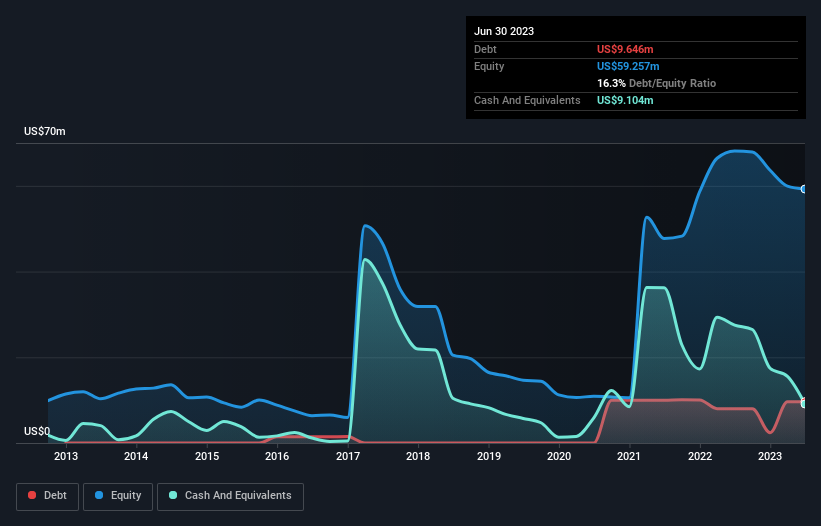Warren Buffett famously said, 'Volatility is far from synonymous with risk.' When we think about how risky a company is, we always like to look at its use of debt, since debt overload can lead to ruin. We can see that ProPhase Labs, Inc. (NASDAQ:PRPH) does use debt in its business. But is this debt a concern to shareholders?
What Risk Does Debt Bring?
Debt and other liabilities become risky for a business when it cannot easily fulfill those obligations, either with free cash flow or by raising capital at an attractive price. In the worst case scenario, a company can go bankrupt if it cannot pay its creditors. While that is not too common, we often do see indebted companies permanently diluting shareholders because lenders force them to raise capital at a distressed price. Of course, the upside of debt is that it often represents cheap capital, especially when it replaces dilution in a company with the ability to reinvest at high rates of return. When we think about a company's use of debt, we first look at cash and debt together.
View our latest analysis for ProPhase Labs
How Much Debt Does ProPhase Labs Carry?
The image below, which you can click on for greater detail, shows that at June 2023 ProPhase Labs had debt of US$9.65m, up from US$8.00m in one year. However, it does have US$9.10m in cash offsetting this, leading to net debt of about US$542.0k.

How Healthy Is ProPhase Labs' Balance Sheet?
Zooming in on the latest balance sheet data, we can see that ProPhase Labs had liabilities of US$14.8m due within 12 months and liabilities of US$17.0m due beyond that. On the other hand, it had cash of US$9.10m and US$38.6m worth of receivables due within a year. So it actually has US$15.9m more liquid assets than total liabilities.
This short term liquidity is a sign that ProPhase Labs could probably pay off its debt with ease, as its balance sheet is far from stretched. Carrying virtually no net debt, ProPhase Labs has a very light debt load indeed. The balance sheet is clearly the area to focus on when you are analysing debt. But it is future earnings, more than anything, that will determine ProPhase Labs's ability to maintain a healthy balance sheet going forward. So if you want to see what the professionals think, you might find this free report on analyst profit forecasts to be interesting.
Over 12 months, ProPhase Labs made a loss at the EBIT level, and saw its revenue drop to US$79m, which is a fall of 40%. To be frank that doesn't bode well.
Caveat Emptor
Not only did ProPhase Labs's revenue slip over the last twelve months, but it also produced negative earnings before interest and tax (EBIT). Indeed, it lost US$6.9m at the EBIT level. Looking on the brighter side, the business has adequate liquid assets, which give it time to grow and develop before its debt becomes a near-term issue. Still, we'd be more encouraged to study the business in depth if it already had some free cash flow. So it seems too risky for our taste. There's no doubt that we learn most about debt from the balance sheet. However, not all investment risk resides within the balance sheet - far from it. For example - ProPhase Labs has 2 warning signs we think you should be aware of.
At the end of the day, it's often better to focus on companies that are free from net debt. You can access our special list of such companies (all with a track record of profit growth). It's free.
New: Manage All Your Stock Portfolios in One Place
We've created the ultimate portfolio companion for stock investors, and it's free.
• Connect an unlimited number of Portfolios and see your total in one currency
• Be alerted to new Warning Signs or Risks via email or mobile
• Track the Fair Value of your stocks
Have feedback on this article? Concerned about the content? Get in touch with us directly. Alternatively, email editorial-team (at) simplywallst.com.
This article by Simply Wall St is general in nature. We provide commentary based on historical data and analyst forecasts only using an unbiased methodology and our articles are not intended to be financial advice. It does not constitute a recommendation to buy or sell any stock, and does not take account of your objectives, or your financial situation. We aim to bring you long-term focused analysis driven by fundamental data. Note that our analysis may not factor in the latest price-sensitive company announcements or qualitative material. Simply Wall St has no position in any stocks mentioned.
About NasdaqCM:PRPH
ProPhase Labs
Develops and commercializes novel drugs, dietary supplements, and compounds in the United States.
Adequate balance sheet with slight risk.
Similar Companies
Market Insights
Community Narratives


Recently Updated Narratives


Engineered for Stability. Positioned for Growth.


MINISO's fair value is projected at 26.69 with an anticipated PE ratio shift of 20x


Fiverr International will transform the freelance industry with AI-powered growth
Popular Narratives


MicroVision will explode future revenue by 380.37% with a vision towards success


NVDA: Expanding AI Demand Will Drive Major Data Center Investments Through 2026



